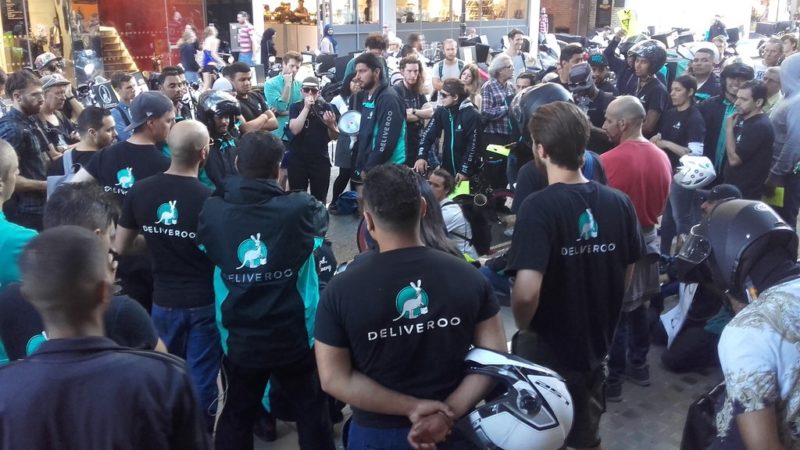Former Left Foot Forward Editor James Bloodworth has exposed the grim realities of work in the UK. Nostalgia for the past is not the solution.

For most of the commentariat, debate on the so-called gig economy has been filtered through one lens – that of the customer.
But James Bloodworth – a former editor of this website – has tried to get beyond the ill-informed clamour of newspaper columns to the real story. And his new book ‘Hired: Six Months Undercover in Low-Wage Britain’ is a challenge to both left and right.
This is a story of Amazon workers ranked from slowest to fastest, of ‘Taylorism‘ at its most intense. But alongside the constant surveillance sits what Bloodworth describes as ‘a rhetorical universe distinct from the flesh and blood of reality’ – warehouses called ‘fulfilment centres’ and so on.
The undercover investigations – from being a carer in Blackpool to holding a call centre job in the South Wales valleys – are interspersed with pretty devastating figures (and at times, the pleasingly floral, Orwell-esque language of cigarettes and English culture).
We learn that in 2015, 38% of workers earned less than the amount the average homeowner earned from the increase in value of their house. That just 6% of care beds are now in public hands, with care agencies charging £13 an hour to councils but giving workers under £8 (and much less if you include travel time). And we are seeing see the return of ‘rent-to-own’: TVs which cost £150 but end up £400 with interest.
Class matters
But it’s important to first set out the context of this shift. The rise of neoliberal politics – privatisation, deregulation and economic ‘liberalisation – is well trodden. Alongside this, there has been a downgrading of the working class in status.
Yet there are as many people working in call centres now as in mines at the peak of the industry. But amid a surge in exploitation, there has been a relentless focus on ‘social mobility’. Bloodworth doesn’t pull his punches on this one:
“Today the common man is celebrated so long as he is no longer common. Respect isn’t automatically granted to people who do working-class jobs. Instead it goes to those who grab the slippery leavers of social mobility and climb out on the backs of those they leave behind.”
‘Social mobility’ appears as the excuse for making working-class jobs miserable – you can just climb out of it! Yet the new warehouses and ‘gig’ roles are often in areas where pit jobs paid £380-900 a week in today’s money. These towns were rich – and now they are in many sense poorer.
But then the same communities are expected to bow and scrape for new bosses. The refusal to do so should be a badge of national pride however – we have standards.
A common theme of ‘Hired’ is fear and tension: constant underpayment keeps workers both stressed and on the brink. A points-based discipline system in many workplaces (including Amazon) only adds to this fear. Doctors’ notes mean nothing in this world, and a week of illness puts you in line for the sack.
In a context where you no longer need to be fired – bosses can simply reduce your hours or an app can throw you off – the need to conform is overwhelming.
Left-wing nostalgia
It is easy to despair at all this, or to look back. But there’s no need for ‘mania of the past’. Bloodworth is quick to note that those socialists who seek a return to coal mines would not be the ones going down there.
Equally, we should be wary of lamenting the rise and fall of certain jobs: Uber over black cabbies, warehouse roles over those down the mine. It is not so much the job at issue – who laments the loss of the Thames watermen? – it is the conditions at fault. Those conditions are not inevitable.
But it is time for a navel-gazing left to get on our bikes and do something about it.
The challenge
There are noble efforts already underway – the Independent Workers of Great Britain are at the forefront, organising everyone from couriers to cleaners and cabbies. Many of these workers do value flexibility. It’s just that this doesn’t have to mean ‘zero workplace rights’ or flexibility solely on a multinational’s terms.
Remaking the gig economy on workers’ terms isn’t impossible – it is something we should start fighting for. ‘Hired’ doesn’t aim to show us how to do that, but it does give us vital evidence for our armoury.
Josiah Mortimer is Editor of Left Foot Forward. Follow him on Twitter.
‘Hired: Six Months Undercover in Low-Wage Britain’ is published by Atlantic Books and is now available.
Left Foot Forward doesn't have the backing of big business or billionaires. We rely on the kind and generous support of ordinary people like you.
You can support hard-hitting journalism that holds the right to account, provides a forum for debate among progressives, and covers the stories the rest of the media ignore. Donate today.



